Many state lotteries promote themselves as key supporters of education, funding scholarships, school programs, and public institutions. But how much of the lottery revenue actually reaches schools, and how effectively is it used? At Dewakoin, we take a closer look at how lottery funds are allocated, their impact on education, and whether they truly benefit students as advertised.
1. How Do Lotteries Fund Education?
Most state-run lotteries allocate a portion of their revenue to education. The typical distribution of lottery funds is:
- 50-60% – Paid out as prizes to winners
- 5-10% – Given to retailers as commissions
- 30-40% – Allocated to education, infrastructure, or other state services
In states where education is a primary beneficiary, the funds may go toward:
- Public K-12 schools
- College scholarship programs
- School infrastructure projects
- Teacher salaries and support programs
However, not all states use lottery money the same way, and in some cases, the funding does not always result in additional educational improvements.
2. Do Schools Actually Benefit from Lottery Revenue?
While lottery-funded education programs sound promising, there are concerns about how the funds are used. Some key issues include:
- Lottery funds replacing existing education budgets – Instead of increasing education funding, some states use lottery money to replace funds that would have been allocated from general tax revenue.
- Unequal distribution of lottery scholarships – In some states, lottery-funded scholarships primarily benefit students from higher-income families rather than those in need.
- Lack of transparency – Some states do not clearly disclose how lottery money is allocated, making it difficult to determine its true impact.
In Georgia, for example, the HOPE Scholarship is a widely praised lottery-funded program, but research has shown that a significant percentage of the funding goes to middle- and upper-class students rather than low-income families.
3. States That Successfully Use Lottery Funds for Education
Some states have been more effective in directing lottery revenue toward meaningful educational improvements.
California
- The California State Lottery contributes over $1 billion annually to public schools, funding classroom supplies, technology upgrades, and teacher salaries.
Tennessee
- Tennessee’s lottery-funded HOPE Scholarship has helped thousands of students afford college tuition at state institutions.
Florida
- The Bright Futures Scholarship Program uses lottery funds to provide merit-based college scholarships to residents.
These states demonstrate that lottery revenue can significantly support education when used responsibly and transparently.
4. Common Criticisms of Lottery-Funded Education
While lottery funding can provide valuable financial support, critics argue that it is not a perfect system.
1. Lottery Funding is Unstable
Lottery revenue fluctuates based on ticket sales, making it an unreliable source of funding for long-term education planning.
2. Funds Are Not Always Used as Advertised
In some states, lottery money does not result in additional funding for education but is instead used to balance state budgets.
3. Lottery Games Disproportionately Target Lower-Income Communities
Since lower-income individuals spend a higher percentage of their earnings on lottery tickets, some argue that this funding system creates an unfair burden on those who can least afford it.
5. How Can Lottery Revenue Be Used More Effectively?
1. Increase Transparency
States should publish clear, publicly accessible reports detailing how lottery funds are spent.
2. Ensure Lottery Funds Supplement, Not Replace, Education Budgets
Lottery revenue should be used to enhance school funding, not serve as a substitute for existing tax-based education budgets.
3. Expand Support for Low-Income Students
Scholarships funded by the lottery should prioritize students from disadvantaged backgrounds rather than being solely merit-based.
4. Cap Administrative Costs
Some states allocate a significant portion of lottery funds to administration and advertising rather than education. Setting a cap on these expenses can help direct more money into classrooms.
6. Final Thoughts: Is Lottery Revenue Helping Education?
Lottery revenue has the potential to provide significant benefits to schools, students, and educators. However, its impact varies by state, depending on how funds are allocated and managed. While some states effectively use lottery funds to improve education, others divert the money toward general budgets, limiting its true benefit.
To maximize the positive impact of lottery revenue, transparency, accountability, and equitable distribution of funds are essential. At Dewakoin, we encourage responsible participation in lotteries and informed discussions about how funds are used to benefit public education.
